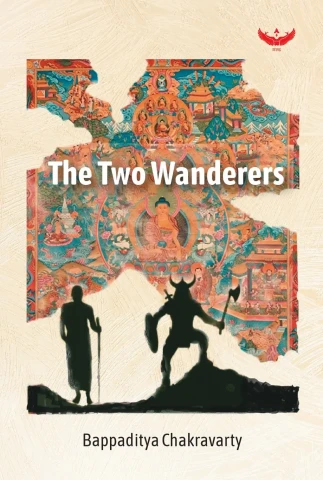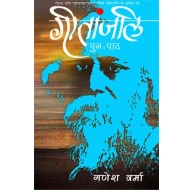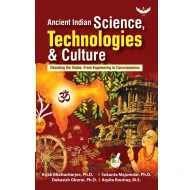
The Two Wanderers
Short Description
The 9th Century... Two men set out from two different corners of the world for reasons of their own. A student of Nalanda, lately trained in martial arts, sets out on a search for the meaning of life. A Viking, caught in the snares of scheming Eastern politicians, seeks to turn from his life of looting and killing. They are fated to meet in Tibet in an epic adventure, and learn the meaning of life and their fates. This book by bestselling author Bappaditya Chakravarty is a thrilling and thoughtful page-turner.
More Information
| ISBN 13 | 9798885751032 |
| Book Language | English |
| Binding | Paperback |
| Total Pages | 344 |
| Release Year | 2023 |
| Publishers | Garuda Prakashan |
| Weight | 349.00 g |
| Dimension | 15.24 x 22.86 x 1.77 |
Product Details
|
Chapter 1 Snorre inter was settling on the small village of Gødesby in Jutland, near the Danish trading port of Hedeby, after a long summer. Snorre the Unruly, a tall man in his early thirties, boasting a golden beard, a golden mane of hair, and piercing blue eyes, sprawled on a high-backed chair. His stockinged feet stretched out towards the fire, a tumbler of spiced ale in his hand. His longsword in its scabbard hung from the back of the chair. Around him, seated on piled bear and sheepskins, were three adults—his mother, Asa, his brother, Bjorn, Torgunn, Bjorn’s wife—and their three children. Beyond the circle of the firelight, the rest of the long hut, with its benches and long dining table, was in darkness. Outside, it was snowing heavily, and a high wind moaned. Snorre began to speak. I My friend Sriverma, the Indian—the best friend and companion a man could wish for—used to say that life is the paradox of the middle. Even a baby is born into the middle of a relationship between its parents. He also said that life is made up of countless flows and all that happens are merely waves. If you go against the flow, you will have to pay a price for it—sometime, somewhere, somehow. Following his wisdom, let me begin in the middle. As you know, I spent three years in Hedeby as a clerk. Three years that taught me to read, write, and made me streetwise. I went a-Viking after that, going on many raids, the last one with Ulf the Greyhound. The story I am about to tell begins in the middle of that last raid. It was a grey day, and we were in a small village in the Anglo-Saxon kingdom, Mercia, near a place called Sandwich. I was alone on the road leading into the village, while my companions were looting a small manor. I was about to follow my comrades when I heard a shriek from behind one of the cottages. Ever curious, I unshouldered my axe and ran. It was a strange scene. Two rogues were trying to separate a young woman from her baby. She was holding the baby with one hand and the neck rope of a cow with the other. The woman’s clothes were already half torn, and her shawl lay on the ground. The baby was crying and the woman screaming, but no one came to help her. With a roar, I was upon them. The men had not seen me coming, and it was already too late for them. My axe almost cleaved the first man into half. A fountain of blood erupted, drenching the cow. I placed my boot on the body and freed my axe. Then I looked at the other man, who was still tugging at the woman’s skirt. He must have realized that it was too late to run away and turned on me. He swung his club, hitting my helmet. It rang hollowly, and I was disoriented for a moment. He hit me again. Ignoring the pain and the ringing in my ears, I swung my axe and chopped his head off. The woman was now sitting on the ground, her baby beside her. She looked at me with large, fearful eyes. I must have looked a sight, dripping with blood. I took off my helmet, and with a clean corner of my cloak, wiped my face. Then I too sat down. Suddenly, I felt drained and very tired. The woman did not understand my language, so I cupped my hands to signal that I wanted water. She got up, wrapped her shawl around herself, and smiled at me. I had never seen anything so beautiful in such a grisly setting—two dead bodies, one headless and the other cleaved in half, blood everywhere, and above, grey clouds and a watery sun. I stared at her. The woman smiled again, motioned to the baby to stay where it was, and went inside the cottage, returning shortly with a jug of water. I found some rope and tying the bodies with it, started to pull them away. I wanted to cleanse the yard. The woman did a funny thing then. She knelt in front of me and bowed her head. I did not know what to do, so I simply smiled at her, touched her head with my fingers, and went my way, dragging the two bodies behind me. You may say that my action was most un-Viking like. Possibly. I don’t know. It all felt so different but necessary. Maybe that is why I have never forgotten that afternoon. II At the age of twenty-five, I found myself in Birka in Sweoland, the land of the Swedes. After a month of boredom, I was finally offered the captaincy of a lido under Svein Gaptooth, on a trading mission going to Bolgar in the Far East. We performed the usual ritual of sacrificing a sheep and watching how the blood ran, as we warped out of the harbour. We were all happy that the blood flow augured well for the journey, for, had the blood not run down the forepart of the ship, the journey would go badly. Sailing up the coast of Balagard, and then up the Voder River, we finally came to Staraja Ladoga, a small settlement of Varangians— Swedes—that was fast becoming the centre for trade with Serkland, the land of the Saracens. I remember the stop at Staraja Ladoga only because a dying Danish merchant gave me a parchment before he died. The man, called Stig—or wanderer in our Norse tongue—thought it was a treasure map. It was, but of a completely different kind of treasure. III We carried the ship over land from Voder River to Beloye Lake. It was hard work. Eight oxen pulled the ship on rollers, and four others pulled the two carts loaded with our trade goods and personal belongings. The carts had big wooden wheels, and we had to stop frequently and grease the axles with pork fat to stop them from catching fire. Our final stop was Bolgar on the Volga River, where Arabs and others come to trade. I was kidnapped in Bolgar. As the legends say, the three Spinners weave our destinies, and only they know what they do. IV I had walked into a tavern for a tankard of ale. Although many of the Volga Bulgars were now Mussulman, the alehouses still existed, catering to wayfarers from as far away as Cathay or India. The tavern was low-ceilinged and smoky. Torches burned in sconces on the walls. Rough people sat on benches along the walls, drinking and talking in loud voices. Alehouses are the same all over the world. I walked up to the counter, where an old man in a beaver-fur hat was serving. I got myself a tumbler of ale and looked around for a place to sit. At that moment, a child—perhaps the grandson of the old bartender— walked up to me, screwed up his nose, and said in a clear, bell-like voice, ‘Northmen stink!’ The whole house burst into laughter, and I also laughed, a little ruefully, for it is a fact that we northerners are not great on personal cleanliness. One man in the crowd—taller than the rest—would not let the jest go. He raised his tumbler and said in a loud voice, ‘Hey, stinking Northman, I drink to the day when you and your stink leave our land,’ and waited for the laughter from the rest of the crowd. It never came. With the first words, I was already at his side, my sword nudging his chin. I forced him to stand and said in a quiet voice, audible to all in the now silent alehouse, ‘You stink too, stranger, but in a different way. So let us go outside and see who stinks the most. There is a child here, and I do not want him to see or smell your stinking blood.’ The man roared and would have jumped me, but my longsword kept him at a safe distance. I remember taking a quick look around and seeing the faces of the other people in the room. Some looked shocked, some afraid, and others hid their faces behind their tumblers. No one moved; the child was now safely behind the counter. I edged to the door, and with a backward kick, flung it open, all the while holding the point of my sword to the man’s chin, forcing him to follow. Once outside, I jumped three or four paces away and faced the man. He was almost as tall as me and built to match. He faced me with his own sword in one hand and a large, curved knife in the other. People poured out of the houses along the road to watch, and windows sprouted heads. The shafts of light from the windows made dancing patches on the flagstones. I looked at my adversary. I knew that when he moved, it would be swift, and if I let him close in on me, my longsword would be of no use against his dagger. I tried to hold his eyes, but the play of light and dark in the street made it difficult. It was obvious that he was an experienced fighter for he was patient. He circled me now, and I turned with him, holding my sword at an angle and slightly away from my body, and waited for his lunge. There was silence all around. The spectators seemed to hold their collective breath. Above, the stars shone brightly in a dark, clear sky. Below, my opponent and I danced a pavane of death. A breeze rustled the leaves of the few trees around. All this I noticed in passing, my eyes still trying to hold his. As the wind strengthened, the man lunged. I was ready. I jumped sideways and brought my sword around in a scything stroke that neatly cut off his sword arm at the elbow. As he almost wonderingly looked at the fountain of blood from his arm, I used my reverse cut to nearly slice his body in two. The thud of the falling body and the sigh from the onlookers were almost simultaneous. I stepped up to the body, and in a move that I was unable to explain to myself, chopped off his other arm and legs. I said loudly, ‘Now you all know that every part of this man stinks, so I leave it to you, good citizens of Bolgar, to remove this carcass before it poisons the air of your city. To make it easy for you, I have chopped him up so that he can fit into a wheelbarrow,’—for that was the real size of this man. I turned my back on the ugly scene and walked away into the darkness, my limbs suddenly heavy. V I don’t remember for how long I walked. My mind was numb, my eyes unseeing, and I was enveloped in a sadness that I had never experienced before. The stupidity of the whole incident hit me like a body blow. I was angry and disgusted with myself. I had killed an ugly man, who no doubt, deserved his ugly death. But was I, the killer, less ugly? Something was wrong somewhere. This could not be a way of life, where one killing just led to another. I remembered a Viking poem that Törben , a fellow Viking, a senior in King Olaf’s lido had once recited to me, when both of us had been quite drunk: I’ve been with sword and spear Slippery with bright blood Where Kites wheeled. And how well We Vikings clashed! Red flames ate up men’s roofs, Raging, we killed and killed, And skewered bodies sprawled Sleepy in town gateways. I thought of the poem, and was quite disgusted at the picture it painted, though I remember laughing hugely when Törben had recited it. I could not understand it – this feeling in myself. You are a man of peace, Bjorn, but I am a warrior, and war is my business. But I understood then the difference between killing in a war and killing simply because I did not know how else to deal with a situation. I sat down on a stone and put my head in my hands. Time passed. It might have been an hour, or it might have been less. Suddenly, ropes were thrown around me, and I was trussed up like a chicken. There were five or six men, and they manhandled me onto a cart in total silence. I lay, unable to breathe properly, so tightly had they bound me. My sword’s scabbard dug into my back, and every time the cart rolled over a stone, the pain was excruciating. They had left me with my knife, but my hands were tied at my sides, and I could not get at it. VI The pain overrode everything else—my dismay at the sudden capture, the ignominy of being bound, and the bone-jarring miles over rough roads. I didn’t think I’d be killed. They could easily have plunged a knife into my back while I was sitting on the stone. Instead, they had bound me—with my weapons intact. I figured that I was being taken to someone important and that there was some honour in the whole business since I had been left my weapons. After an eternity, which was perhaps nearer two hours, during which the pain in my back got worse and worse, we stopped. My bonds were cut. I tried to stand on my cramped legs and fell. I sat up, groaning and creaking in every joint, and finally hauled myself upright. A young man, dressed in fine, soft woollen clothing, was waiting. He said something, and a man standing beside him translated. ‘Burya, the eldest son of Chief Artiga of the Kyla Pechenegs, welcomes you in the name of his father. He apologizes for the way you have been brought here. Burya says that all will be explained later when you meet his father. Please freshen up now.’ ‘But why bring me here at all? I am just a warrior, a captain under Svein Gaptooth, a representative of King Olaf of Birka. If Chief Artiga wants to talk trade, then surely Svein is your man?’ I said. The translator haltingly conveyed all this to Burya, heard his reply, and said to me, ‘Burya says that this has nothing to do with trade; his father will explain everything to you.’ Burya snapped his fingers, and a woman appeared, holding a bowl of water. I made myself presentable and looked up. Burya nodded and indicated that I should follow him. It was a large camp, laid out like a wheel, perhaps three hundred tents in all, with a separate large enclosure for livestock. Small fires burnt in front of most of the tents, and there were quite a few women and children. We walked to the central tent. Pushing aside a silk curtain, Burya invited me in. There were thick, bright-coloured carpets on the floor. Burya indicated that I should take off my boots and left me seated on a low rug-covered stool. I looked around. It was a big tent. In the centre, facing me, was a straight-backed chair with arms. It had cushions in bright colours and was clearly the chief ’s seat. I thought a little politeness might work and so took off my sword and laid it down on the ground, keeping the knife in my belt. So far, these people had been friendly, but one never knew. I looked at my boots a little ruefully. If I were attacked, there would be no time to put them on again. I consoled myself with the thought that I could take another man’s boots and always chop off his legs if he declined. That cheered me up. After a little while, a man entered from the other side of the tent. He was around fifty and bareheaded, with a close-trimmed black beard speckled with grey. I can only describe his face as interesting. It showed authority, intelligence, and awareness. I did not need to be told that this was Artiga, the chief. Burya reappeared with the translator. A woman placed tumblers of ale at our elbows. Artiga motioned me to drink, himself taking a long sip. I emptied half my tumbler in one go, and the woman came in again to refill it, exiting as silently as she had entered. Only then did Artiga speak. He spoke slowly in the language of the Rūs, which is very similar to our own Norse language, and I replied in my own tongue. ‘I welcome you in the name of our Khagan, and I hope your journey was not too uncomfortable.’ He smiled to show that this was a joke, so I also smiled back. ‘A few cushions would have helped.’ He sighed and drained his tumbler. I did not touch mine. This was his camp, and I needed a clear head. ‘You have done me a great favour today,’ he said, setting the tumbler down. The woman immediately appeared and refilled it. ‘How so?’ I was surprised. I had never met or even seen a Pecheneg before today. Just heard stories. ‘You killed Uze Rybor, a personal enemy.’ We drank to that. So Rybor was the name of the rogue I had killed. ‘But how could he be your enemy? He was just a rogue, a lone man, and you are a chief,’ I asked, surprised. ‘He and his small band robbed the merchants from the East who trade with the Rūs through me. In this land, we keep the peace, and Rybor was trouble. My people rushed the news of his death to Burya, who happened to be in the town on other business. Rybor’s body parts were also collected by my men and brought here.’ He smiled grimly. ‘Would you like to see?’ I shook my head. ‘The job is done, so... why spoil the taste of a perfectly good ale?’ And took a long sip from my own tumbler. Artiga shrugged dismissively. The subject was closed. But then, why was I here? I did not have to wait long for an answer. Some food had arrived, and Artiga spoke after biting into a piece of roast lamb. ‘I have a job—no, let us call it a commission—for you, if you want it. Otherwise, you are free to go. My men will leave you at the boundary of Bolgar.’ I kept silent, and he went on, ‘I am sending a daughter of mine with a group of merchants to Chachkand in two or three days. She is to be married to a prince of our cousins, the Kangars. I would like you to lead the escort.’ This surprised me. I had heard many stories of the fierceness of the Pecheneg warriors—how they made lightning strikes from horseback and how their wagon camps were practically forts. Why should such people need an outsider, and moreover one who could not even speak their language? Artiga waved his hand. ‘My people are good on horseback but not in hand-to-hand fighting. That is where the Uzes and the Cumins get the better of us. Our people are hotheaded. A long journey of this kind requires a cool head, and from the accounts of the fight that I have heard, you seem to have that. You outsmarted Rybov. You see,’ and he shrugged again, ‘a group of merchants is one thing, and the honour of my daughter is something else again.’ ‘Also,’ Artiga continued, ‘there is another thing that I want you to do,’ waving his hand at the translator, who left. Then he said something to Burya, who also went out, to return with a leather cylinder that he handed to his father. Artiga turned over the cylinder, as if to check that the seal was unbroken, then put it aside. ‘I want you to hand this over to the Grand Prince of the Kangars, or his prime minister, but to no one else.’ ‘Again, why me? Why not one of your trusted men who can travel with the group?’ I gestured towards Burya. ‘Surely, he is the right man for this or one of your other sons?’ My head was swimming a little, and not just from the wine. Artiga shook his head. ‘Burya is going with you. As my eldest son, he will be my daughter’s guardian and hand her over to her husband.’ ‘That does not really answer my question, does it?’ I replied. He smiled again. ‘I can see that you think beyond swords and fights. Well, the reason is, you are a neutral, with no interest in our affairs, and this scroll coming from your hands will mean that it has not been tampered with. I am sorry, but in this kind of business, there is no trust even between brothers.’ I now accepted a piece of meat and tried to think quickly. Something was missing here, some piece of the puzzle that I was not being told. ‘There is some political secret in that?’ I pointed to the cylinder. ‘Yes, there is. However, it is late, and you should rest.’ Artiga made to get up and then sat down again. ‘You must be wondering what there is in it for you. I shall finance you to the extent of five hundred gold Dinars. It is a small fortune, but nothing compared to the honour of my daughter, which, of course, is priceless. Half of this sum you will get tomorrow if you take the commission. The other half will be given to you at Chachkand once you have completed your tasks. With this money, you can buy merchandise and travel back here. I myself will arrange for their sale and a good profit for you. And I do not want my capital back. Does that satisfy you?’ It was more than generous. I nodded and extended my hand. He put his over mine. Burya added his own hand, and thus was the pact sealed. As we got up to leave, Artiga added, rather dismissively, ‘We will spread the word that you have been kidnapped.’ Thus, from a Norse warrior, overnight, I became the envoy for a Pecheneg Chief and the keeper of his daughter’s honour. Snorre stopped and raised his tumbler to his lips. Bjorn and Asa got up and left quietly with their children, stopping only to put another log on the fire. Outside, the snow continued to fall. There was an eerie silence, punctuated only by the crackling of the fire. Snorre remained where he was, lost in the past.
|
|

















